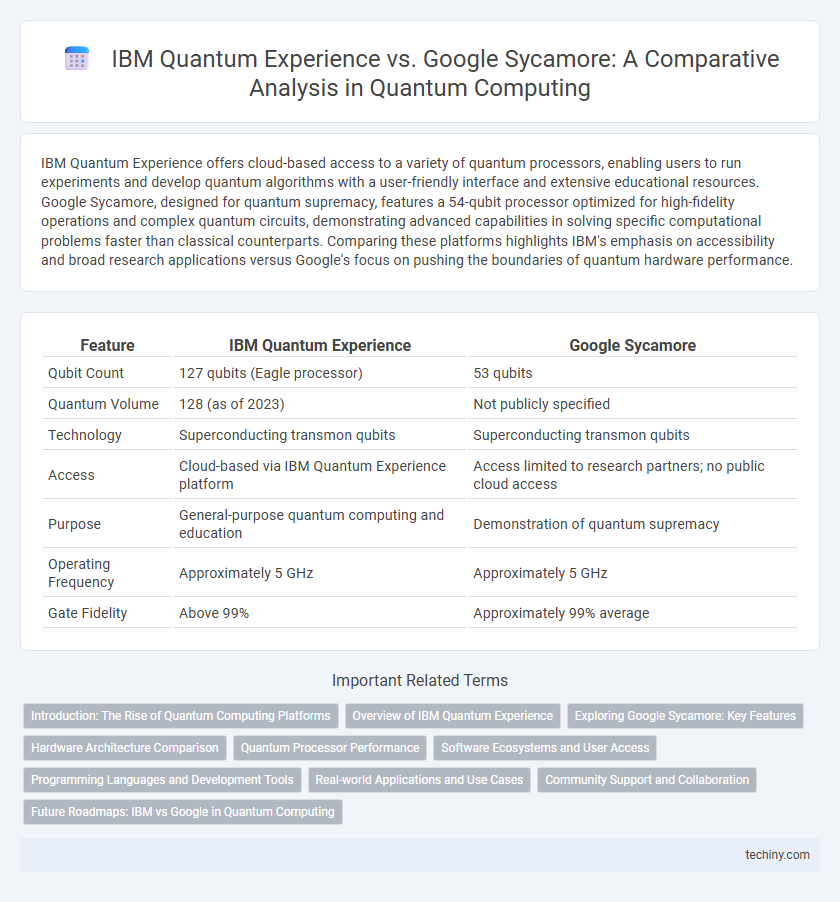IBM Quantum Experience offers cloud-based access to a variety of quantum processors, enabling users to run experiments and develop quantum algorithms with a user-friendly interface and extensive educational resources. Google Sycamore, designed for quantum supremacy, features a 54-qubit processor optimized for high-fidelity operations and complex quantum circuits, demonstrating advanced capabilities in solving specific computational problems faster than classical counterparts. Comparing these platforms highlights IBM's emphasis on accessibility and broad research applications versus Google's focus on pushing the boundaries of quantum hardware performance.
Table of Comparison
| Feature | IBM Quantum Experience | Google Sycamore |
|---|---|---|
| Qubit Count | 127 qubits (Eagle processor) | 53 qubits |
| Quantum Volume | 128 (as of 2023) | Not publicly specified |
| Technology | Superconducting transmon qubits | Superconducting transmon qubits |
| Access | Cloud-based via IBM Quantum Experience platform | Access limited to research partners; no public cloud access |
| Purpose | General-purpose quantum computing and education | Demonstration of quantum supremacy |
| Operating Frequency | Approximately 5 GHz | Approximately 5 GHz |
| Gate Fidelity | Above 99% | Approximately 99% average |
Introduction: The Rise of Quantum Computing Platforms
IBM Quantum Experience offers cloud-based access to superconducting qubit processors, enabling researchers and developers to experiment with quantum algorithms remotely. Google Sycamore gained prominence by achieving quantum supremacy in 2019, demonstrating the capability to solve specific problems faster than classical supercomputers. Both platforms drive innovation in quantum computing by providing distinct architectures and tools essential for advancing quantum algorithm development and hardware scaling.
Overview of IBM Quantum Experience
IBM Quantum Experience offers cloud-based access to real quantum processors, providing users with a platform to run experiments on real IBM Quantum hardware, including devices such as the 27-qubit Falcon processor. The platform supports Qiskit, an open-source quantum software development framework, enabling developers and researchers to design, simulate, and execute quantum algorithms. IBM Quantum Experience emphasizes accessibility and education, fostering a growing ecosystem of users from academia, industry, and independent learners worldwide.
Exploring Google Sycamore: Key Features
Google Sycamore boasts a 54-qubit processor designed to achieve quantum supremacy through complex, high-fidelity entanglement and fast gate operations. Its architecture leverages superconducting qubits with tunable coupling, enabling error rates below 0.1%, critical for executing intricate quantum algorithms. Sycamore's ability to perform random circuit sampling marks a significant benchmark, demonstrating superior computational speeds over classical supercomputers in specific problem domains.
Hardware Architecture Comparison
IBM Quantum Experience utilizes superconducting transmon qubits arranged in a lattice architecture optimized for error correction and gate fidelity, supporting scalable quantum processors with up to 127 qubits in their latest systems. Google Sycamore features a 54-qubit superconducting chip based on a two-dimensional grid topology designed to maximize qubit connectivity and minimize crosstalk, enabling complex quantum circuits through high-fidelity entanglement. The key hardware architecture distinction lies in IBM's modular, error-corrected design aimed at scalability, whereas Sycamore emphasizes achieving quantum supremacy with high-performance, tightly interconnected qubits.
Quantum Processor Performance
IBM Quantum Experience leverages superconducting qubit technology with processors like the 127-qubit Eagle, emphasizing error mitigation and scalable architecture to enhance coherence times and gate fidelity. Google's Sycamore processor, featuring 53 qubits, demonstrated quantum supremacy with a focus on high-fidelity two-qubit gates and low error rates, showcasing advancements in quantum volume and circuit depth. Performance comparisons highlight IBM's ongoing improvements in qubit connectivity and error correction versus Sycamore's pioneering benchmark in executing specific complex algorithms faster than classical supercomputers.
Software Ecosystems and User Access
IBM Quantum Experience offers a comprehensive software ecosystem with the open-source Qiskit framework, enabling extensive quantum algorithm development and cloud-based access for researchers and developers globally. Google Sycamore primarily provides access through Cirq, an open-source Python library designed for implementing and experimenting with quantum circuits on Google's quantum processors. IBM's platform emphasizes broad user access through a scalable cloud interface, while Google targets advanced quantum hardware testing and research collaboration within a more specialized environment.
Programming Languages and Development Tools
IBM Quantum Experience offers development through Qiskit, an open-source Python framework enabling users to create, simulate, and run quantum circuits with extensive libraries and community support. Google Sycamore leverages Cirq, a Python-based framework designed for NISQ devices, focusing on low-level circuit construction and noisy hardware simulation. Both platforms provide cloud-based access to quantum processors but differ in programming abstractions, with Qiskit emphasizing user-friendly high-level algorithms and Cirq targeting experimental control.
Real-world Applications and Use Cases
IBM Quantum Experience offers extensive cloud-based quantum computing resources tailored for practical applications in chemistry, optimization, and machine learning, enabling researchers and industries to experiment with quantum algorithms in real-world scenarios. Google Sycamore excels in achieving quantum supremacy through high-fidelity qubit operations, demonstrating potential in complex problem-solving tasks like material simulation and cryptographic research. Both platforms advance quantum computing use cases, with IBM focusing on accessibility and hybrid algorithms, while Google emphasizes breakthrough quantum processing capabilities.
Community Support and Collaboration
IBM Quantum Experience offers a robust and accessible cloud-based platform with extensive community support, including forums, tutorials, and open-source resources that foster collaboration among researchers and developers worldwide. Google's Sycamore primarily showcases breakthrough experimental quantum supremacy but has a more restricted public interface, limiting direct community engagement and collaborative opportunities compared to IBM's ecosystem. The strong developer network and continuous software updates within IBM Quantum Experience create a vibrant environment for collective innovation in quantum computing.
Future Roadmaps: IBM vs Google in Quantum Computing
IBM Quantum Experience plans to expand its quantum hardware by developing larger superconducting qubit architectures targeting over 1,000 qubits by the mid-2020s, with the introduction of modular quantum systems and enhanced error correction techniques. Google Sycamore emphasizes achieving quantum advantage through improvements in qubit coherence times and implementing more complex algorithms, aiming to scale their Sycamore processors with advanced error mitigation and pulse-level control. Both companies prioritize advancing quantum software stacks and cloud-based access, but IBM focuses heavily on ecosystem development and commercial applications, while Google concentrates on groundbreaking scientific demonstrations and scalability.
IBM Quantum Experience vs Google Sycamore Infographic

 techiny.com
techiny.com